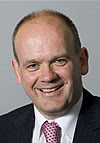Thursday, September 27, 2012
Police and Crime Committee
Today I attended my first meeting of the relatively new police and crime committee. Initially I had agreed to stand in for Victoria Borwick who was at a funeral but on Tuesday I had a surprise visit from the group leader - he asked me to take the committee place permanently as Conservative spokesman on policing, following Steve O'Connell's appointment as an advisor to the Deputy Mayor.
The committee has been fractious in the past, with confrontation between the members and Stephen Greenhalgh, the combative Deputy Mayor for Policing. Today Stephen was accompanied by Deputy Commissioner Craig Mackey and the tone was more positive.
Management Reorganisation
With £500 million savings required from the budget, senior management was being reduced, also allowing more investment in the front line. The witnesses refused to rule out the possibility that some boroughs would be combined under single management and the borough commanders would have to share some of their back office functions. At present borough commanders hold the rank of chief superintendent (except in Lambeth and Westminster where they are full commanders), but in future this might not be the case.
I urged the Deputy Mayor to preserve geographical structures below the borough commanders rather than opt for functional 'silos' which would endanger the excellent partnership work being shared by councils and other public services at borough level. By all means we should seek to save money but take care to preserve the strengths which flow from local links.
Estates Strategy
The property review was expected to cut the MPS estate by around a third, saving at least £50 million and providing an opportunity to relocate services to better sites. However confused messages are raising fears in communities around the city.
I told the witnesses that the closure of Wanstead police station in 2001 had to be reversed because crime spiked by over 20%. Surely they wanted to avoid such costly reversals of decisions this time. They refused to comment on Wanstead in particular but the Deputy Mayor said that no front counters would be closed without his agreement - and he hadn't signed any off. The Estates Strategy would be published and would be subject to consultation, which should be very welcome news for campaigners.
The witnesses agreed with me that response times and the distance between front counters would be key criteria in the review - not just the number of people currently visiting. Counters which were closed would be replaced like for like - a key commitment which had been in some doubt. And the possibility of using volunteers to staff front counters would be considered, particularly in the light of the great volunteering spirit engendered by the 2012 Games.
As part of the review MOPAC HQ in Westminster will be closed with 65 staff transferring to City Hall and reporting to the Deputy Mayor.
Vetting and Supervision
The recent cases involving PC Simon Harwood who assaulted Ian Tomlinson at the G20 protests, and an officer in the specialist Sapphire rape unit who had falsified police records, raised concerns about vetting of police officers and their supervision.
The Deputy Commissioner assured us that systems had been improved and lessons learned. An officer with Harwood's record of complaints of violence would now be spotted more swiftly with appropriate action taken. Management changes at Sapphire should reassure victims that their cases would be effectively investigated.
Jenny Jones raised the question of supervising undercover officers who often had to make tough decisions in life threatening circumstances. The witnesses said it would not be acceptable for an undercover officer to commit or participate in a crime. Also, they should seek permission before taking part in sexual relationships with suspects or others in their undercover role. Jenny wondered if children from such liaisons would become the police's responsibility - the Deputy Commissioner considered this highly unlikely.
Gang Strategy
The anti - gangs strategy had targeted 1,500 gang members, severely hampering their activity and reducing the number of stabbings and shootings. The witnesses appealed for more diversionary initiatives to steer young people away from gang culture along with better employment opportunities. Although out of the headlines recently, gangs remained a high priority for Scotland Yard.
Subscribe to:
Post Comments (Atom)


2 comments:
Over the past few weeks, I have noticed quite a few traffic cops. Is there a reason why there a lot of traffic cops around East London?
Is is the case, they need to cash from Fixed Penalty Notices for policing?
I don't mind if they have the odd crackdown, but there is a change of policy for revenue raising, then what happens to the *real* criminals like burglars, muggers, pick-pockets, murderers...?
Traffic police are going out in regular blitzes at the moment. They are using number plate recognition technology to identify untaxed and uninsured vehicles. This does raise money from fines but more importantly it identifies particular people the police are interested in.
Not everyone who fails to tax their car is a criminal, but most career criminals break laws like this on a routine basis. So whilst the police are issuing a fine they will also check for other evidence of criminal activity.
The same theory is used with blitz ticket checks on buses and trains which often expose other criminal behaviour.
Post a Comment